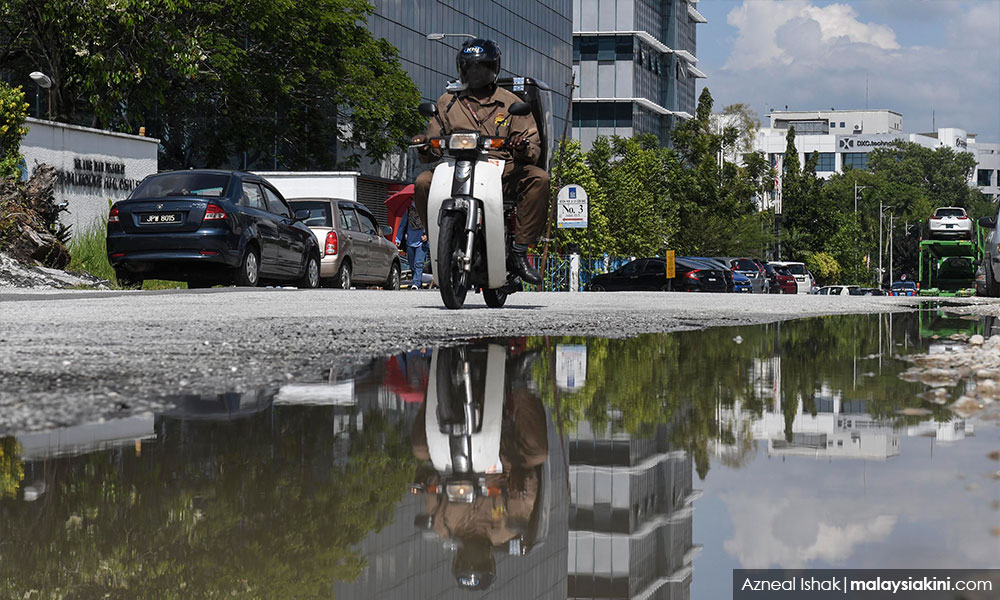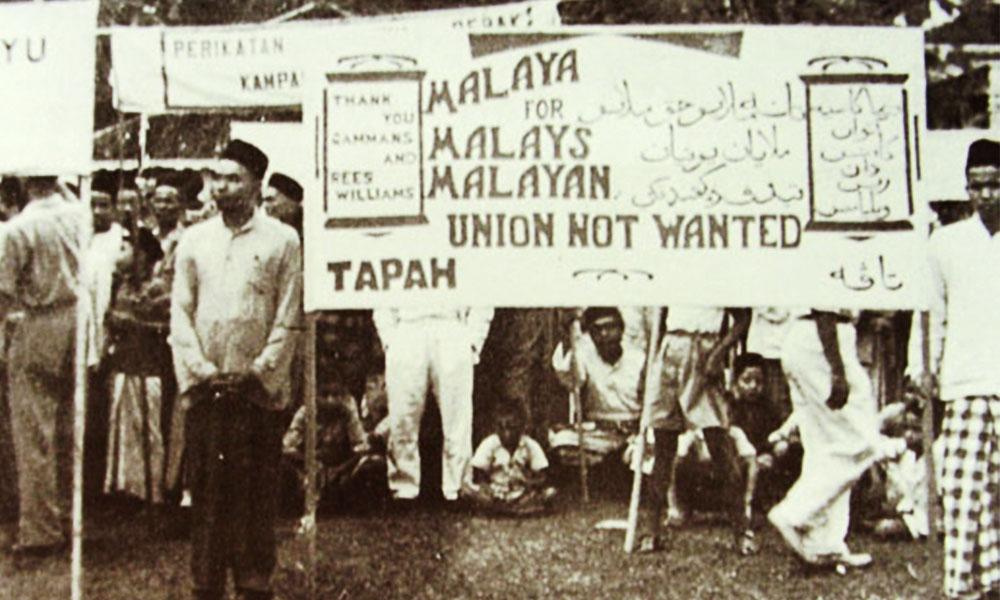The real lesson of potholes
Unless you are “lucky” enough to have a minister falling into a pothole while cycling, it’s unlikely you will see quick government action to fix that problem in your neighbourhood. So what’s the solution?
Can we lure more VIPs to cycle in our area and hope that they hit “bingo”? Or do we write endless surat rayuan (appeal letters) to the little lords who are supposed to be civil “servants”?
Khairy Jamaluddin’s fall and injury after hitting a pothole in Banting, Selangor, on Dec 26 revealed our modern feudal culture. The district Public Works Department (PWD) rushed to repair the pothole and apologised to the minister, in an abject display of “kowtowing to the elites”.
Yet, there was no such luck for more humble people. A week later, a 75-year-old man died after he fell off his motorbike which had hit a pothole near Mid Valley Megamall in Kuala Lumpur. The day after, a Grab food rider died after his motorbike hit a pothole near Mutiara Damansara, Petaling Jaya. Did we hear any apology from the PWD?
Khairy’s accident should have been a clear reminder of how dangerous potholes are, after all, the PWD itself had pledged “zero potholes” way back in 2016 after deadly accidents then. Did the little lords have to wait for the ‘Big Lords’ to cycle there before doing something?
Since everything in Malaysia is racial, we should also ask - are most motorcyclists Malay? Hmm, isn’t that the same group that this Perikatan Nasional government claims to “defend” and “protect” from the “evil” DAP? But was it the DAP that caused those potholes or failed to repair them?
Help ourselves
So what do we do? Potholes in Middlesbrough, England were quickly fixed after an artist spray-painted penis graffiti around them as a protest. This “miracle” was cheekily described in a BBC report as “the power of the willy.”
If that is too naughty, how about using that feudal mentality to get things done? What if someone spray-painted graffiti making fun of certain politicians at potholes? Will the PWD then rush to remove the graffiti for fear of angering the nation’s lords? And, hopefully, fix the potholes while they’re doing that?
Perhaps the best option is self-help. Stop waiting for the government to get off their backsides to do things and do it ourselves. I am well aware that potholes are even more dangerous for me as a cyclist than for motorcyclists because bicycles don’t have shock absorbers to cushion the jolt. So, I’ve taken it upon myself to repair potholes on routes which I frequent.

All you need are either bricks (30 sen each at hardware stores), pieces of concrete (salvaged from house renovation sites) or loose rocks. I’ve found that Malaysia, being the land of litter, offers such materials for free everywhere, sometimes even near potholes!
All that’s needed is five minutes to collect them and plonk them into the pothole, something which I regard as an extra exercise to my cycling. Just one brick can prevent a small pothole from getting bigger and bigger. And it may end up saving a life.
If you want to make your “work of art” more permanent, just buy a RM2 packet of cement, mix it with sand and water (watch this guide) and pour it onto those bricks or rocks. Voila! You have finally fixed that darn pothole that’s been bothering you for months!
The ability to fix these small problems feels liberating and empowering - no longer do we need to stew in frustration at “the blardy garmen” for not doing their work!
People power
In my own area of Petaling Jaya, the residents association hired a contractor to repair the cracked pavement at the padang rather than wait for the city council to do it. Similarly, I have seen how the community in Taman Melawati, just outside Kuala Lumpur, have turned a rubbish-strewn riverside into a pleasant garden where residents can stroll along.
Hikers and mountain bikers at Bukit Kiara, KL, spent years building trails using simple cangkul to turn the area into a public adventure park. And while the government floundered with delivering food to the elderly and foreign workers during the last movement control order in March, it was volunteers who stepped in to fill the gap.
Can this be upscaled and taken to higher levels? Perhaps we can do a bit more than moan at the suspension of Parliament during this emergency. How about we create more of our own democracy, in our own communities?
Wakil rakyat, who may or may not do frog jumping, are just a part of democracy. What’s more important is the rakyat and taking steps to make us feel more empowered, rather than helpless. This is how Umno became a force, by galvanising the Malays to fight against the Malayan Union concept (that the feudal royalty had agreed to with the British in 1946) until the idea had to be scrapped.

On a more modest scale, whenever there is a local problem, be it blocked drains, uncollected rubbish, development causing floods etc, it often takes a community effort to win the battle to get things fixed. And people have given up on asking the police to patrol their neighbourhoods and nowadays band together to hire their own guards.
But we don’t need to wait for such problems to bring us together. We can take our own small steps, for example, create a Facebook or WhatsApp group of all the residents in our neighbourhood. Or organise more events, say during festivals, to bring people together (instead of being glued to their smartphones or TV’s all the time).
Once people feel a sense of community (something often lacking in our urban areas), then we can figure out what we want to do with that collective voice. For example, what if 80 percent of town residents are united in demanding local council elections? If this happens, we will probably see potholes rapidly filled because city leaders want to get re-elected!
We have become so used to the mindset of hoping for, appealing, or even begging, for reforms from modern-day feudal lords (big and small). Yet history (including that of Umno itself) has shown that most change starts when the people push for it, from the ground up, rather than top-down.
And the politicians have to respond because they are, after all, creatures of popular support. For example, see how fast the decision to ban self-service coin laundromats during the current MCO was reversed after loads of dirty clothes led to loads of complaints.
Our country is such that we have to make some noise (or to use the American term, “we gotta raise hell”) before anything is done. If not, the next best thing is to help ourselves.
Perhaps this is the lesson we can learn from potholes.
ANDREW SIA is a veteran journalist who likes teh tarik khau kurang manis. You are welcome to give him ideas to brew at tehtarik@gmail.com. - Mkini
The views expressed here are those of the author/contributor and do not necessarily represent the views of MMKtT.
✍ Credit given to the original owner of this post : ☕ Malaysians Must Know the TRUTH
🌐 Hit This Link To Find Out More On Their Articles...🏄🏻♀️ Enjoy Surfing!




















Post a Comment